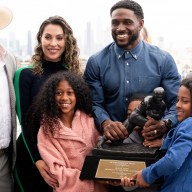 Steve Coogan stars as nudie mag owner Paul Raymond in “The Look of Love.”
Steve Coogan stars as nudie mag owner Paul Raymond in “The Look of Love.”
Credit: Getty Images
Thanks to films like “The Trip,” the actor and writer Steve Coogan has risen in stature in the U.S. But he’s a legend in England. His latest film concerns another British mainstay: “The Look of Love,” which reunites him with director Michael Winterbottom (“24 Hour Party People,” “Tristram Shandy,” as well as “The Trip”), isa biopic on Paul Raymond, a strip club and nudie mag owner who was at one point England’s richest citizen. Coogan also has coming out the long-rumored, now-completed film on his most famous creation, the incomparably foolish Alan Partridge, called “Alan Partridge in Alpha Papa.”
How aware of Paul Raymond were you before this film?
As a teenager growing up, you’d go into the newsstand and get up on your tiptoes and try to grab the soft porn magazines on the top shelf. He was always on the back cover, surrounded by semi-nude women. You’d think, “Who is that guy? He’s obviously living the life.” I knew his daughter had died. He was a tabloid figure, a bit eccentric, always immaculately dressed. He had a weird hairdo, almost as weird as Donald Trump’s. I met him once, but I just shook his hand. I was doing a comedy routine at a club of his that was being used as a TV show. But I never know him at all.
What is your take on him now?
He behaved like an aristocrat in some ways. I think his image was a figment of his imagination — he created this character. He had the clothes, he had the car, he had the house, he had the girls — he had all those things that are supposed to make uncomplicated men happy. It didn’t really make him happy. I think he wasn’t really into sex. It was a business to him. He’d have these threesomes, but he was almost going through the motions, like he didn’t’ really enjoy it. It was just a thing you were supposed to do if you’re living a wild life.
He was like the last one at the party.
You can enjoy a party, but if you’re the last one there, you’ve made a mistake. He didn’t know when to quit. He was very successful, he challenged a lot of social mores about sex, he kicked against the conservatism of his times. Not that he was doing it for noble reasons. He was trying to run a business. There’s something Shakespearean about him — he built a kingdom that brought him sadness.
What was your initial angle on the film when you pitched it to director Michael Winterbottom?
Michael gravitates towards things that are not obvious. We thought that no one talks about sex anymore in movies — not explicitly. People don’t know how to handle nudity, so we end up with “Showgirls.” Americans don’t know how to handle sex. They laugh at it, snicker at it, or they’re very, very serious about it, and you get films with soft-focus shots of people making love in a very dignified way. Both sides are untruthful. We thought this would be a little spiky, fun and also kind of sad. We didn’t want to do a finger-wagging thing, like if you watch too much porn you’ll go blind. We didn’t want to do something that was self-important either. We wanted to try to be more truthful.
You often play awful people, but you also play nice characters. Tommy Saxondale, from “Saxondale,” is generally a good guy. Raymond isn’t bad, but he’s not good either.
I like to make complicated characters likable. I always found playing someone who’s likable very difficult. There’s some great actors who ooze integrity and you trust them and you like them in films. I don’t know how to do that. I would quite like to be able to do that, but it’s a challenge for me to make a character like that interesting. People who are shades of light and dark are more dynamic and more interesting. What keeps someone watching a character sometimes is they haven’t made up their mind about them, whether they like them or not. If you’ve decided if some guy is a good guy, then it’s a challenge to make that compelling. I’d like to play some nice people and not be boring.
You’ve brought Alan Partridge back recently, after a long hiatus. What has it been like returning to that character?
I brought the character back because I found these two writers who brought new life into him, who really got him but also made him fresher. And I did it because I was doing other work alongside it. I couldn’t embrace Partridge if it was the only thing I was doing. I’d feel self-conscious, like an old band reforming for money. But because I’m doing these other things, I can enjoy it. Partridge, he makes me laugh. I never do anything because I feel I ought to or to make money. I do it because I have the creative impetus to do it. Alan’s like a relative or an old friend you like to hang out with him, but you don’t want to spend the rest of your life living with them.
Do you find yourself becoming more sympathetic towards him as you get older?
Yeah. We used to make him a lot more reactionary and right wing. We found it funnier to give him some liberal views. It’s like, if someone says something racist, it’s not funny. But if someone who tries to say the right thing and accidentally says something racist, that’s funnier. We just go with what makes us laugh.
















